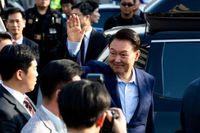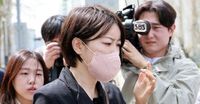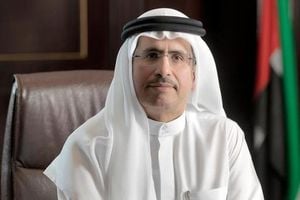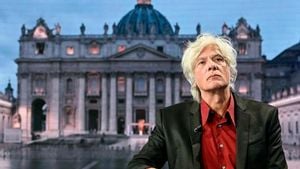On April 17, 2025, a South Korean court imposed a fine of 15 million won (approximately 352,500 baht) on the daughter of former President Moon Jae-in for drunk driving and operating Airbnb businesses without proper registration. The Seoul Western District Court ruled against Moon Da-hye, 42, stating that she had a blood alcohol concentration of 0.149 percent, exceeding the legal limit of 0.08 percent. The incident occurred in October of the previous year when she collided with a taxi while attempting to change lanes in the Itaewon area of Seoul.
In addition to the drunk driving charges, Moon was found to have illegally run three Airbnb properties in the Yongsan district of Seoul and on Jeju Island, a popular tourist destination. Prosecutors had previously recommended a one-year prison sentence for her, and they are currently considering whether to appeal the court's decision.
Meanwhile, the South Korean stock market experienced a significant decline on the same day, attributed to concerns over the audit of ADT Capstone, a security firm. The market lost 15 billion won amid worries about potential misconduct related to Airbnb operations. Reports indicate that the Seoul government is tightening regulations on audits conducted during Moon Jae-in's administration, which has raised public scrutiny regarding past governance.
Yun Suk-yeol, the former president who was ousted from office, is currently facing a rebellion trial. During the proceedings, he asserted that the declaration of martial law last year was not a coup attempt. His efforts to impose martial law were short-lived, lasting only six hours before being overturned by the National Assembly, which led to months of civil unrest and ultimately his removal by the Constitutional Court this month for constitutional violations.
Yun, who appeared in court on April 14, 2025, dressed in a dark blue suit and red tie, argued against the prosecutors' claims that he lacked legal justification for declaring martial law. He stated, "The declaration of martial law was not a coup d'état," emphasizing that he intended to alert the public to the opposition party's actions that he viewed as dangerous.
Prosecutors contended that Yun's actions hindered constitutional institutions from functioning properly, claiming, "The defendant... prevented constitutional institutions from exercising their powers based on an unlawful declaration." Yun defended himself, asserting that his intention was not to disrupt the government but to signal the severity of the opposition's actions, which included the removal of over 20 officials.
As the trial progresses, the stakes are high for Yun, whose rebellion charges could lead to life imprisonment or even capital punishment, though South Korea has not executed anyone in decades. The declaration of martial law has not only caused turmoil across various sectors of society but has also exposed deeper societal rifts between conservative and liberal factions.
In a related economic development, the Bank of Korea (BOK) issued a statement on April 17, warning that the country's economic growth may fall below previous forecasts. The BOK decided to maintain its base interest rate at 2.75% in an effort to stabilize the won amid uncertainties stemming from changes in U.S. tariff policies. The bank's decision aims to allow for a more thorough assessment of both domestic and international economic conditions.
According to BOK officials, the country's economic outlook is fragile, with domestic demand and exports slowing down due to prolonged political uncertainties and deteriorating trade conditions. The BOK's Monetary Policy Committee emphasized the need for caution regarding rising exchange rate fluctuations and the potential increase in household debt under relaxed monetary conditions.
Lee Chang-yong, the BOK governor, remarked that the uncertainties surrounding U.S. tariff policies have led to sudden challenges for South Korea. The BOK has opted for a gradual approach to monetary policy, postponing any drastic changes until the economic situation becomes clearer. The committee will continue to monitor developments closely, with speculation that a rate cut of 0.25% may occur at the next meeting on April 29, 2025, depending on the economic assessment.
The intertwining of political and economic issues in South Korea is creating a complex landscape as the country prepares for upcoming elections on June 3. Questions remain regarding Yun Suk-yeol's potential role in these elections, adding to the uncertainty surrounding the nation's political future.
As South Korea grapples with these multifaceted challenges, the public's demand for transparency and accountability continues to grow. The ongoing audits and legal proceedings involving former leaders underscore the pressing need for reform and integrity in governance. With the backdrop of economic instability and political strife, the nation stands at a crossroads, with its future direction hanging in the balance.






